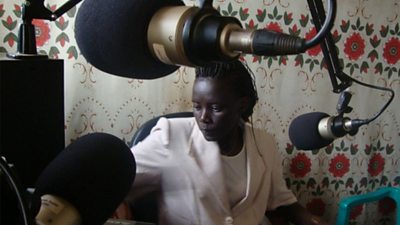It has woken us up from sleep. A lot of things that we would not have known, now we know.
In January 2011 the vast majority of people in South Sudan voted for independence from the rest of the country. The world's newest nation was born six months later.
In preparation for this historic referendum, ±«Óătv Media Action launched Voice and Participation, a project to support senior editors and journalists in rural radio stations to educate voters on their rights through unbiased coverage.
Throughout 2010 and 2011, over 200 journalists were trained to produce radio programming and were supported to report on events around the referendum and independence in an accurate and balanced way.
The aim was to inform people about their voting rights and, importantly, how to vote – essential for a country that had held only one election in the previous 24 years.
Despite very low literacy levels, conflict and instability, the UN declared the vote timely, fair, peaceful and credible.
Enabling voter participation
±«Óătv Media Action trained editorial staff in nine local radio stations. Partners in the project included South Sudan Radio, the Sudanese Catholic Radio Network and Internews. Participants learnt how to produce accurate and balanced news and programmes through classroom-based learning, and on-the-job training and mentoring.
The courses didn't just cover news. They also trained journalists to produce discussion and debate programmes.
These programmes gave the voting public the chance to air their views regardless of ethnicity, gender or political affiliation, often for the first time.
They were also able to raise their concerns and hopes for the new South Sudan with government representatives.
Six young trainees were also recruited to work alongside journalists from ±«Óătv Arabic and ±«Óătv African English services. Their reports were broadcast on ±«Óătv World Service, bringing South Sudanese voices to a global debate on the future of their country.
Power of radio
For most people in South Sudan, especially women and people living in rural areas, radio is the only way of finding out about, and making sense of, their rapidly changing country.
The unstable security situation, extremely poor roads and damaged airstrips often make it nearly impossible for vital services to get to people outside urban areas.
But radio reaches the remotest areas and stretches across ethnic and geographic boundaries.
This is significant because of radio's power to improve people's knowledge, change attitudes and behaviours and express new ideas.
A young woman from the south west of the country sums up what radio means to her village. "It has woken us up from sleep. A lot of things that we would not have known, now we know."
Project information
| Project name | Voice and Accountability |
| Funder | Dutch Ministry of Foreign Affairs |
| Dates | 2010-2012 |
| Themes | Governance |
| Partners | Sudan Catholic Radio Network, South Sudan Radio |
